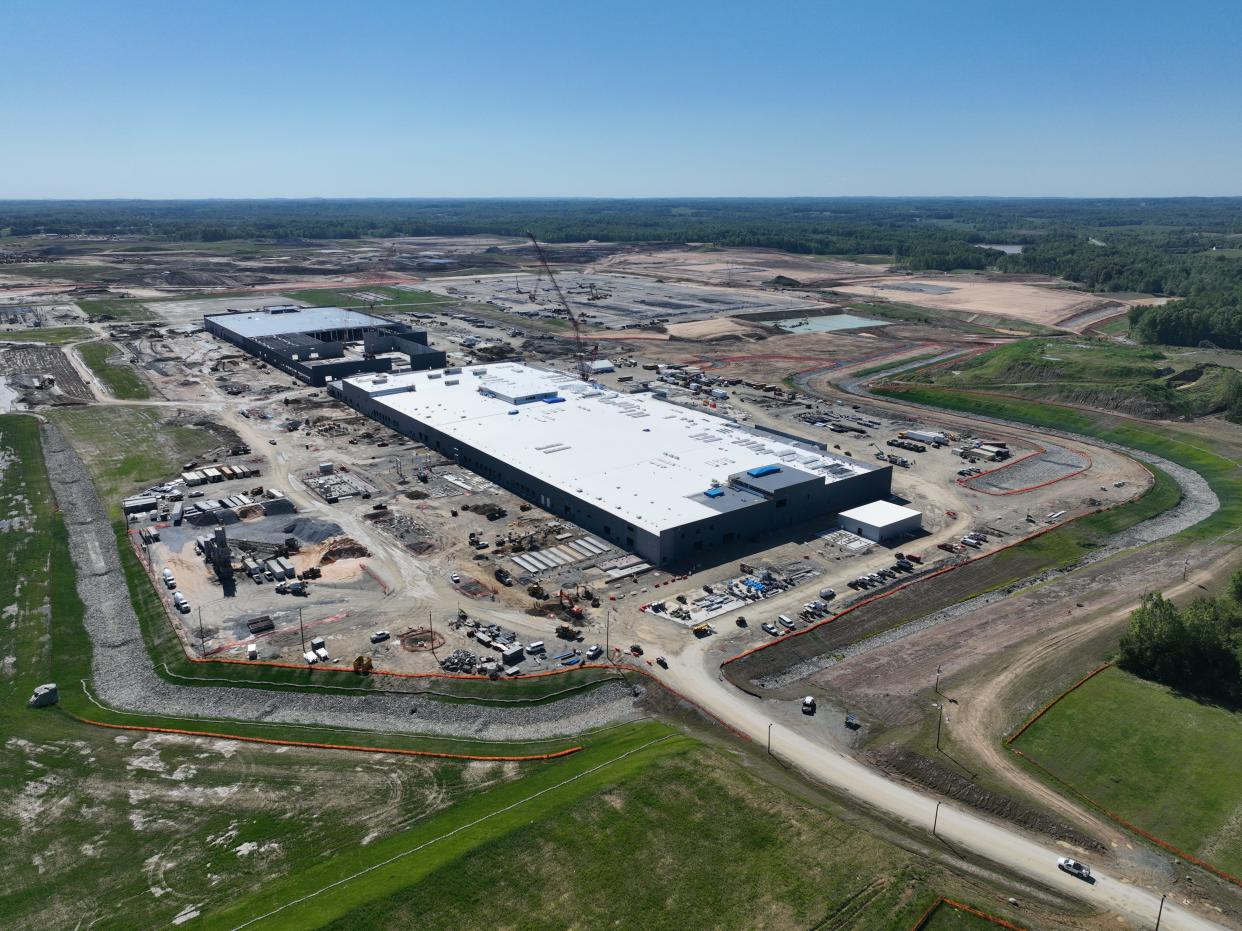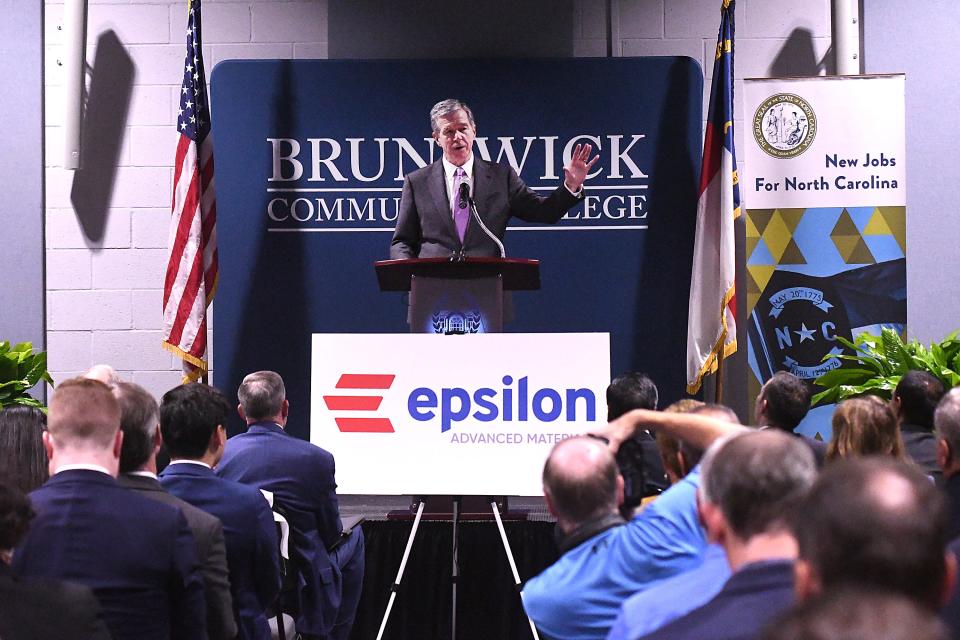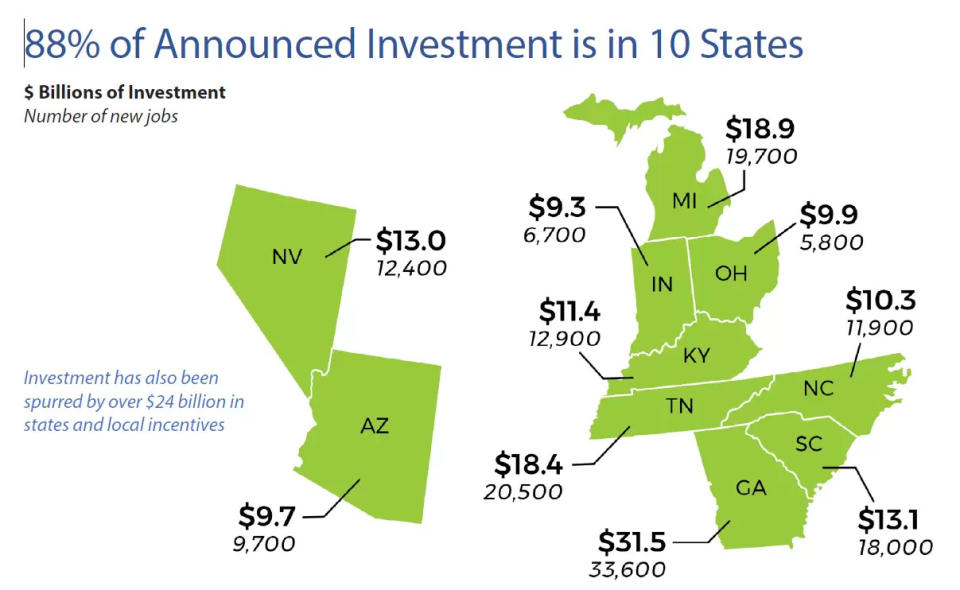As electric vehicle businesses invest in NC, what will it take to spark their success?

From the foothills to the coast, North Carolina is charging up for the next-generation of electric vehicle manufacturing that is steadily revolutionizing the automotive industry, a business that has changed little since Henry Ford perfected the moving assembly line for his Model T more than a century ago.
Close to Wilmington in Brunswick County, Epsilon Advanced Materials recently announced a $650 million investment to build a manufacturing plant that will produce graphite for use in EV batteries. The Indian-company's first U.S. facility will employ an estimated 500 workers when it is fully operational near the end of this decade.
More than 240 miles from the Port City in Gaston County, Piedmont Lithium is still working on securing the necessary permits and financing to open a $1.2 billion mine and processing plant that could supply millions of EV batteries. Five counties to the east of the proposed mine, North Carolina's first automotive plant, an electric vehicle assembly line planned by Vietnam-based VinFast, continues to take shape in Chatham County − even amid some concerns about the financial health of the young company, which was founded in 2017.
But easily the cherry on top for North Carolina's push to recruit EV-related industries has been Toyota, which late last month announced plans to more than double its investment in its electric battery manufacturing site in Randolph County. The additional $8 billion and 3,000 workers boosts the Japanese automaker's total investment in the project, which is expected to open in 2025, to $13.9 billion and more than 5,000 jobs.
“North Carolina’s transition to a clean energy economy is bringing better paying jobs that will support our families and communities for decades to come,” Gov. Roy Cooper said in a statement announcing the additional investment by Toyota.
But does North Carolina have the workforce and training avenues needed to provide employees for businesses associated with the still-nascent EV industry? And what about the health of the EV industry itself, one that appears to be slowing down in recent months as early adopters are replaced by middle-class consumers worried about sky-high prices for electric vehicles and charging anxiety?
CHARGING UP As EV sales in NC hit the fast lane, how is Wilmington doing?

Investing in EV training
When companies are looking to relocate or make a major investment, obviously incentives and state and local tax rates play a big part.
But Dr. Mouchine Guettabi, an urban and regional economist at the University of North Carolina Wilmington, said a "bundle of factors" determine where companies go − and access to a trained workforce is a key one.
"It's not a quick decision on where to locate," he said. "These are long-term decisions about the place, and that includes taking a major look at what human capital an area can offer."
It's well known that Wilmington offers an attractive quality of life that draws people to the Cape Fear region, and migration has helped swell the area's population significantly since the early 1990s.
"But do jobs follow people or do people follow jobs?" Guettabi said, noting that the Port City is known for having a large segment of its population that's underemployed when considering their skill set. "In this case, probably a bit of both."
Providing trained workers that companies in emerging industries need is vital to landing big-ticket investments, and officials say one advantage North Carolina has that some of its peer states don't is a highly developed and extensive public university and community college system.

Machelle Baker Sanders, head of the N.C. Department of Commerce, highlighted the importance of meeting employers' needs in providing not just a large but well-trained pool of workers, especially when unemployment remains relatively low.
“This expansion validates my commitment to aligning economic development with workforce development, ensuring we can provide a highly skilled workforce that meets the needs of Toyota and the state’s fast-growing clean energy industry, today and well into the future," she said when Toyota announced its recent expansion plans.
Last week Cooper announced that North Carolina will receive $1.68 million from the Siemens Foundation to help create accessible career pathways in the EV manufacturing and charging sectors in underserved and rural communities.
Closer to home, Epsilon said it plans to partner with Brunswick Community College to develop the skilled workforce the new EV battery plant will require.
Guettabi said investments in educational programs can offer benefits that go beyond a single company.
"Business notices when states and communities set up educational opportunities like that because having that flexibility, growth in your public education systems helps attract companies because they know they'll be able to find or train their future workforce," he said.
GREEN SLOWDOWN? Plastic bags and EVs in the slow lane: What does NC's new budget mean for the environment?
Clustering together
Landing a big fish like Toyota, VinFast or Epsilon can also have a ripple effect.
A report released in August by Environmental Defense Fund (EDF) and Williams Sale Partnership (WSP) found that North Carolina was ranked No. 7 nationally among states in attracting EV-related investment over the past five years, with $10.3 billion projected to create nearly 12,000 jobs. That figure doesn't include the most recent announcements by Toyota and Epsilon, and officials note that the full impact of the bipartisan Inflation Reduction Act passed in August 2022 has yet to be felt.
"These companies are already picking which states they're going to invest in, and we've managed to get ourselves in there, and I think we're going to see continued growth, clustering of similar businesses as the EV supply chain develops and matures," said Will Scott, EDF’s director for Climate and Clean Energy Southeast.
While highlighting North Carolina's strong educational backbone and pool of trained engineers, especially around urban areas, Scott said the state also offers other advantages to companies looking to enter the industry.
"We have a strong manufacturing history that, sure, has taken its hits in recent decades, but has left us with a trained workforce and infrastructure, especially in our rural areas," he said. "And if you're looking at the scale of some of these projects, they're going to have to look to site them in our rural areas."
That North Carolina also has numerous medium- and small-sized urban areas that offer amenities many workers see as vital to having a good quality of life is another advantage, he added.
State officials also have largely set aside their differences when it comes to economic development and recruitment efforts, seeing it as an endeavor that benefits voters of all political stripes and in many areas of the state.
EV momentum won't stop
But even as EV production and the associated supply chain ramps up, questions are being raised at the other end of the market.
Consumer interest in EVs has dramatically cooled this year, with EVs piling up on dealer lots, General Motors and Ford pausing work on new EV factories, and Honda abandoning plans to build an affordable EV with GM. A price war started earlier this year by Tesla has failed to do much to boost its sales but has placed intense pressure on other EV-only companies like Rivian, Lucid and Fisker.
High prices for EVs, even with federal and state tax breaks factored in, and continued consumer concern over charging and a lack of range are blamed for a lot of the slowdown. But analysts and clean energy advocates are playing down the down shift, saying speed bumps in any emerging industry are to be expected. They also note that EV sales rose 50% in the third quarter compared to the same period last year and are expected to account for nearly 9% of all vehicle sales in 2023.
CONTAMINATION QUANDRY Remember GenX and PFAS contaminants? Why they're back in the news and what it means for NC
"These are long-term investments for these companies, not ones they're making based on short- or even medium-term financial considerations," Scott said of the EV projects recently announced in North Carolina. "And the momentum to electrify the automotive sector isn't going to stop anytime soon, and these companies realize that."
After BMW opened its first U.S. auto plant in Spartanburg, South Carolina, in 1994, suppliers and other auto-related businesses flocked to the Upstate region and Interstate 85 corridor. With North Carolina's developing EV ecosystem, officials said they can see the same thing happening in the Tar Heel State.
"Supply chains don't get built overnight, so a lot of these companies are making long-term decisions today," Guettabi said.
And even amid the uncertainty in some sectors of the market today, the writing is on the wall about which way the automotive industry is headed. What still needs to be answered is which countries, states and companies are going to capitalize on electrification − with arguably Tesla and China way out ahead of the competition right now.
"We're going to move in that direction. There's no question about that," Guettabi said. "The question is how fast, and who are going to be the winners."
Reporter Gareth McGrath can be reached at GMcGrath@Gannett.com or @GarethMcGrathSN on Twitter. This story was produced with financial support from 1Earth Fund and the Prentice Foundation. The USA TODAY Network maintains full editorial control of the work.
This article originally appeared on Wilmington StarNews: As EV businesses invest in NC, what will it take to spark success?
